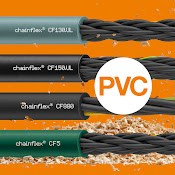Choosing the right cable jacket material for energy chains is critical to ensuring long-lasting, efficient, and safe performance across industrial applications. Among the many materials available, PVC (Polyvinyl Chloride) remains one of the most used for flexible cables. But is it the right choice for your setup? Let’s explore everything you need to know about PVC cables in energy chains.
General Information About PVC Cables
PVC is a widely used thermoplastic material known for its versatility and cost-effectiveness. In the cable industry, PVC is commonly used as insulation and jacketing material. It is especially popular in stationary and limited-flexing applications due to its low cost, ease of processing, and broad availability.
However, not all PVC cables are created equal, especially when it comes to dynamic applications like those involving energy chains, where constant movement, bending, and environmental factors put materials to the test.
Advantages and Disadvantages of PVC in Energy Chains
✅ Advantages:
Cost-effective: PVC cables are among the most affordable cable types, making them a practical choice for cost-sensitive projects.
Flame retardant: PVC materials are inherently flame resistant, meeting basic safety standards.
Oil-resistant (with limitations): Many PVC cables offer some level of oil resistance, useful in industrial settings.
Easy to process: PVC cables are easy to strip, install, and terminate, reducing labor time.
⚠️ Disadvantages:
Limited durability in high-flexing applications: Standard PVC cables can become brittle or crack when used in continuous motion over time, especially in tight bend radii.
Temperature sensitivity: PVC performs poorly in low temperatures, becoming rigid and prone to damage in cold environments.
Not ideal for high-speed travel or long travel distances: In dynamic energy chain systems, the mechanical demands often exceed PVC’s capabilities unless specially formulated.
Application Areas for PVC Cables
PVC cables are widely used in:
Packaging machinery
Assembly and handling systems
Machine tools
Automated conveyor systems
General factory automation
They are best suited for short travel distances, low to medium acceleration, and moderate bending stress—typically where energy chains do not experience high dynamic loads or extreme environments.
How to Find the Right PVC Cable for Your Energy Chain
When selecting a PVC cable for an energy chain, consider the following factors:
Travel length: Standard PVC is ideal for short travel distances (under 10 meters).
Bending radius: Check the cable’s minimum bending radius to match your application’s needs.
Ambient conditions: Avoid using standard PVC in cold or chemically aggressive environments.
Movement type: For continuous-flex applications, make sure the PVC cable is specially formulated and tested for dynamic use.
Using a cable not designed for energy chains can lead to jacket damage, conductor breakage, and premature failure.
With over 30 years of market presence, and backed by rigorous laboratory testing and advanced cable structure design, igus® offers chainflex® PVC cables that significantly extend lifespan and minimize the risk of failure.
Why choose PVC chainflex® cable?
igus® offers 2 types of PVC jacket materials, non-oil resistant and oil-resistant, both are specifically engineered for energy chains. These cables are designed to deliver reliable performance and long service life, supported by the following features:
Tested in the igus test lab under real-life conditions
Optimized for short travel distances, offering excellent price-performance ratio
Certified with UL, CSA, EAC, and other global standards
Available in over 850 variants, covering data, control, motor, servo, and bus cables
Additionally, igus® backs its chainflex® PVC cables with a 4 years guarantee, ensuring confidence in durability and long-term reliability.
With igus, you can also take advantage of tools like:
The chainflex® service life calculator
Free samples for testing
PVC cables can be a solid, cost-effective solution for energy chains—when used in the right conditions. While they may not be suitable for high-speed or extreme environments, their ease of use, flame resistance, and affordability make them ideal for many industrial automation setups.
If you’re looking for a dependable PVC cable tailored for energy chain systems, igus offers proven, tested solutions backed by guarantees and expert support.
👉 Visit our landing page to learn more, or get in touch with our specialists to find the best cable for your application. igus-asean.com/pvc-cables





Comments
Post a Comment